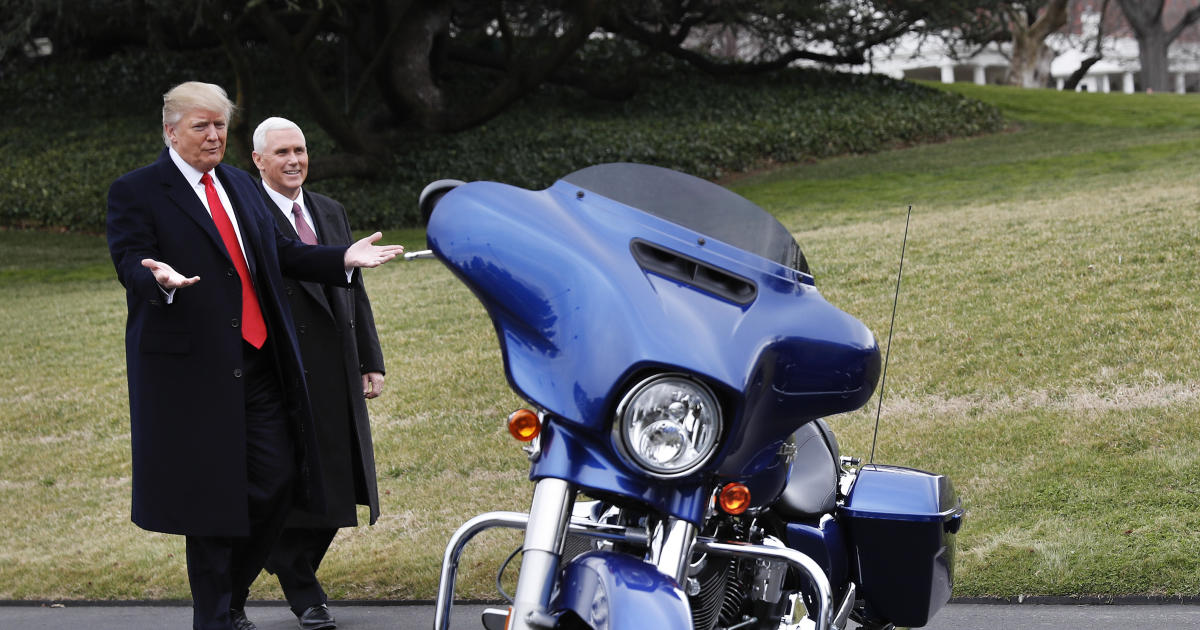
President Donald Trump not long ago held up Harley-Davidson as everything that was right about American manufacturing. Now, Mr. Trump can only see red when he talks about the motorcycle company.
The 180-degree-spinout on Harley-Davidson comes after the motorcycle maker said it’s shifting some production outside the U.S. The company said the move was in response to a brewing trade war sparked by Mr. Trump’s decision to slap tariffs on some European products, which prompted the EU to add its own tariffs — including higher duties on Harley-Davidson vehicles that will add an estimated $2,200 to the price of a motorbike.
In a series of tweets, Mr. Trump framed Harley-Davidson’s announcement as a fake-out, claiming the company had already said it would shift manufacturing abroad and was “just using Tariffs/Trade War as an excuse.” He also vowed to retaliate against Harley-Davidson with taxes and said its “employees and customers are already very angry at them.”
“If they move, watch, it will be the beginning of the end – they surrendered, they quit!” Mr. Trump tweeted. “The Aura will be gone and they will be taxed like never before!”
Shares of Milwaukee-based Harley-Davidson fell 46 cents, or 1.1 percent, to $41.11 on Tuesday. They had dropped 6 percent Monday on the company’s disclosure of the manufacturing shift overseas in response to the EU tariffs.
Harley-Davidson already manufactures in India, according to James Hardiman of Wedbush Securities. But most of its motorcycles sold in Europe are currently manufactured in the U.S., he noted in a research report.
Meanwhile, Wisconsin Gov. Scott Walker — a Harley owner whose support of the business has been intertwined with his rising political career — now must navigate revved up criticism of the Milwaukee-based company from Mr. Trump. Walker said “he believes there should be no tariffs or trade barriers as the President stated earlier this month at the G7 summit,” according to a spokeswoman.
Harley-Davidson didn’t immediately return a request for comment.
Here are the facts about Harley-Davidson and trade.
Harley-Davidson’s Thailand plant will focus on Asian sales. Mr. Trump is right that the company announced plans to build a plant in Thailand long before the current tariff escalation. Yet that factory is slated to build motorcycles for the Asian market, not for Europe. It’s unclear whether the Thailand factory will also ship vehicles to Europe.
Its Kansas City factory closure isn’t tied to shifting jobs overseas. Mr. Trump tweeted, “Harley-Davidson said they would move much of their plant operations in Kansas City to Thailand.” In fact, Harley-Davidson said it was shifting those Kansas City jobs to another factory in the U.S. — in York, Pennsylvania. The closure led to a loss of about 260 U.S. jobs.
Harley announced the Thailand factory after Mr. Trump’s withdrawal from the Trans-Pacific Partnership. The company announced plans to build the new factory in Thailand after the Trump administration withdrew from the Trans-Pacific Partnership, a trade agreement that would have lowered Asian tariffs on some of its motorcycles.
Harley-Davidson isn’t halting manufacturing in the U.S. Mr. Trump seemed to suggest this was a possibility, tweeting, “If they move, watch, it will be the beginning of the end.” Harley-Davidson’s preference is to manufacture within the U.S., but believed shifting some production “was its only sustainable choice to continue serving the EU,” Wedbush’s Hardiman wrote.
Harley-Davidson isn’t the only one complaining about tariffs. House Speaker Paul Ryan criticized Trump administration trade policy after Harley-Davidson’s announcement. The Wisconsin Republican told reporters Tuesday he doesn’t think tariffs “are the right way to go.” He didn’t mention President Trump by name but said tariffs are “basically taxes.” Daimler last week said the tariff escalation will crimp its earnings.
The EU says the consequences of a trade war shouldn’t be a surprise. The EU’s top trade official said the U.S. knew it would face consequences if it put tariffs on European steel and aluminum imports, such as retaliatory tariffs on American manufacturers like Harley-Davidson. Trade Commissioner Cecilia Malmstrom said Tuesday that “there has to be consequences if you do not respect international, global rules.”
Harley-Davidson is struggling with big issues in its home market. Demand for motorcycles has declined for each of the last three years among American buyers and is likely to decline in 2018 as well, Wedbush noted. Changing demographics like aging baby boomers are to blame, but Harley-Davidson also has failed to attract younger consumers.
Europe and overseas markets are now Harley’s growth markets. With sales stalling in the U.S., Harley-Davidson is increasingly relying on Europe and other overseas markets for growth, Wedbush’s Hardiman said. Shifting manufacturing closer to those markets will lower costs and help Harley-Davidson maintain its profit margins — a typical strategy among vehicle manufacturers.
The Associated Press contributed to this report.

